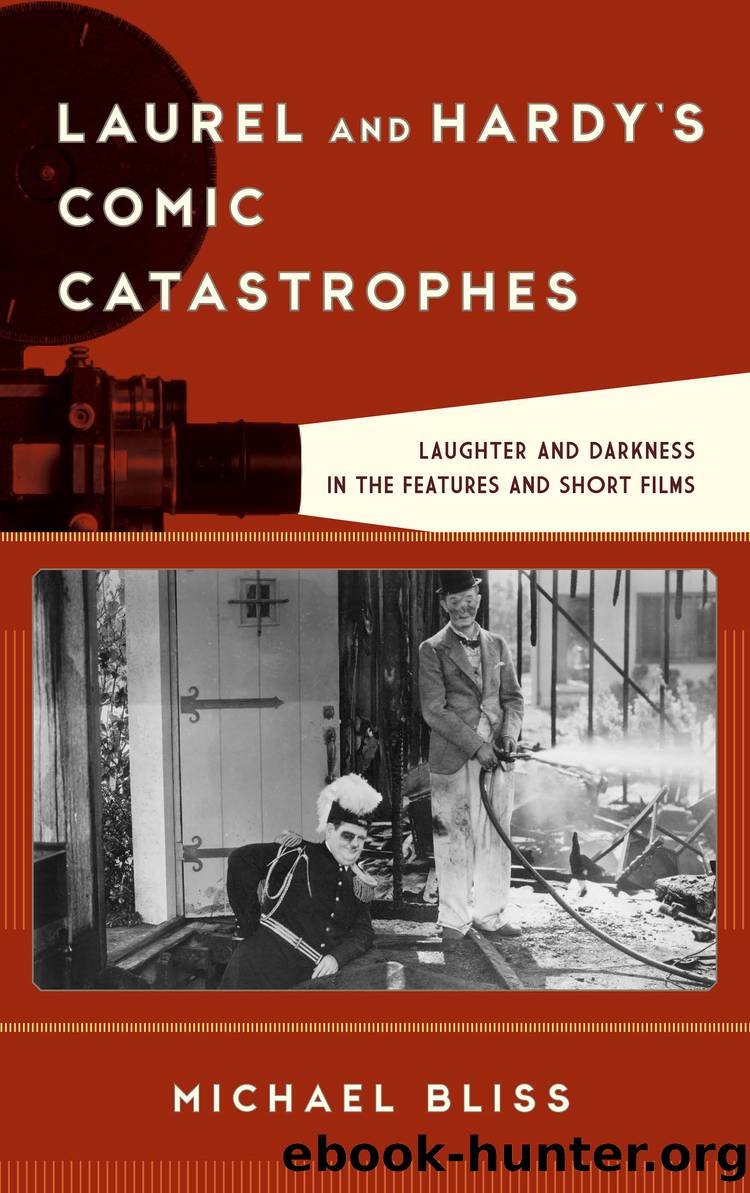Laurel and Hardy's Comic Catastrophes by Bliss Michael;

Author:Bliss, Michael; [Bliss, Michael]
Language: eng
Format: epub
Publisher: Rowman & Littlefield Unlimited Model
Published: 2017-06-07T00:00:00+00:00
Things Arenât What They Seem
The Finishing Touch
Like its sound counterpart Busy Bodies, 1928âs The Finishing Touch is a film about Stan and Ollie working with tools. The difference between the films is striking, though. Where Busy Bodies accepts the world as a given, The Finishing Touch brings into question one of its prime bases: whether or not the manner in which we perceive the world gives us reliable information about it. In other words, the film is concerned with the degree of reality that we assign to the information that our senses report to us. Although this is a sophisticated concept, we shouldnât be surprised that Stan was concerned with it since many of the films he created for Roach showed a comparable interest in using abstract concepts as the thematic basis for a filmâs gags.1
As the filmâs title implies, thereâs an activity going on that leads to a final point at which the activity is complete. The Finishing Touch is about Stan and Ollie building a house, but itâs also a metaphor about what it means to have an initial sensory impression (a âtouchâ if you will) and finish it by trying to understand what the impression means. Essentially, the film is concerned with how unreliable our senses are.
Interestingly, one of the central qualities of the working relationship between Stan and Babe may very well have led to this notion. Early on in his work with Babe Hardy, Stan realized that merely expressing an idea as a running theme throughout a film didnât completely satisfy his desire to fully investigate it. Instead, just as he became aware that what his usually brash and aggressive on-screen character needed was someone who contrasted with him (which resulted in Stan toning down his characterâs rough edges), so, too, did the scripts that he was developing work better at communicating ideas if, instead of expressing them declaratively, he communicated them through what is essentially a platonic dialogue involving opposing ideas and points of view. In this film, Ollie is the empiricist. Almost always he accepts what he sees and perceives. Heâs firmly convinced that he understands how reality works thanks to his trust that his senses accurately report to him what the world is like. However, these ideas are repeatedly undermined in The Finishing Touch by Stan, a disorderly rationalist who unwittingly arranges objects and performs actions in such a way as to lay perceptual traps for Ollie that without fail he falls into. The fact that Stan performs that same types of deceptive acts over and over again, and Ollie repeatedly runs afoul of them, tells us how imperfectly the two of them work together and how unlikely a reconciliation of their different views of the world is.
The filmâs first title card tells us that Stan and Ollie had been in school nine years and never got out of kindergarten, which tells us something about the boys that we should already know: not only canât they make progress, they actually regress,
Download
This site does not store any files on its server. We only index and link to content provided by other sites. Please contact the content providers to delete copyright contents if any and email us, we'll remove relevant links or contents immediately.
Still Foolin’ ’Em by Billy Crystal(36037)
Spell It Out by David Crystal(35840)
The Great Music City by Andrea Baker(30778)
Professional Troublemaker by Luvvie Ajayi Jones(29417)
Trainspotting by Irvine Welsh(21011)
Call Me by Your Name by André Aciman(19895)
We're Going to Need More Wine by Gabrielle Union(18626)
The Secret History by Donna Tartt(18151)
Cat's cradle by Kurt Vonnegut(14756)
Ready Player One by Cline Ernest(13975)
Molly's Game by Molly Bloom(13885)
Bombshells: Glamour Girls of a Lifetime by Sullivan Steve(13680)
The Goal (Off-Campus #4) by Elle Kennedy(13192)
Leonardo da Vinci by Walter Isaacson(12788)
The Social Justice Warrior Handbook by Lisa De Pasquale(11950)
4 3 2 1: A Novel by Paul Auster(11783)
The Break by Marian Keyes(9075)
Crazy Rich Asians by Kevin Kwan(8883)
Adultolescence by Gabbie Hanna(8584)
